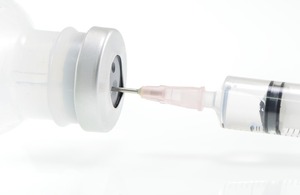New cabotegravir formulations approved to help prevent HIV-1 infection in adults and adolescents
The MHRA has authorised cabotegravir as 30 mg tablets and as a 600 mg long-acting injection administered every two months

The Medicines and Healthcare products Regulatory Agency (MHRA) has today (3 May 2024) approved two new formulations of the medicine cabotegravir (Apretude 30 mg film-coated tablets and Apretude 600 mg prolonged-release suspension for injection) to help prevent sexually transmitted HIV-1 infection (pre-exposure prophylaxis or PrEP) in adults and adolescents weighing at least 35kg who are at an increased risk of infection. Cabotegravir has been authorised as tablets and as a long-acting injection administered every two months.
Tablet-based PrEP is already available for those at risk. Cabotegravir would provide an alternative HIV prevention treatment option for eligible individuals should it be recommended by NICE. Cabotegravir 600 mg long-acting injection is the first injectable treatment approved to help prevent HIV-1 infection in the UK.
HIV (human immunodeficiency virus) is a virus that damages the cells in the immune system and weakens its ability to fight everyday infections and diseases. There are two primary strains, HIV-1 and HIV-2, with HIV-1 being more common. When a person contracts HIV-1, the virus begins to infect a specific type of immune cell called CD4, essential for the body’s immune response.
Both formulations of cabotegravir (tablets and long-acting injection) have been authorised by the MHRA for Great Britain under a national application procedure.
Julian Beach, MHRA Interim Executive Director, Healthcare Quality and Access, said:
Keeping patients safe and enabling their access to high quality, safe and effective medical products are key priorities for us.
We’re assured that the appropriate regulatory standards for the approval of this medicine have been met.
As with all products, we will keep its safety under close review.
Patients must have a HIV-negative test before taking cabotegravir. Cabotegravir 600 mg long-acting injection is administered by a nurse or doctor into the buttock muscle six times a year. Initially, patients receive one injection each month for two months, followed by one every two months. Before starting the injections, patients can take cabotegravir 30 mg tablets daily for a month in consultation with their doctor to assess whether it’s appropriate to proceed with injections (oral lead-in). Cabotegravir should be used in combination with safer sex practices, such as use of condoms.
Cabotegravir belongs to a group of anti-retroviral medicines called integrase inhibitors (INIs). In case of exposure to the virus, it works by blocking an enzyme called integrase that the HIV-1 virus needs to replicate itself in the body, reducing the risk of the virus multiplying and spreading from the site of infection.
This approval is supported by evidence from two main studies that compared cabotegravir to standard PrEP (tenofovir disoproxil fumarate/emtricitabine) for preventing HIV over a period of approximately 3 years (153 weeks). In one study involving around 4,500 HIV-negative cisgender men and transgender women who have sex with men, there was a 66% reduction in HIV-1 incidence among those who received cabotegravir compared to the standard treatment. In the second study, involving over 3,200 HIV-negative cisgender women, there was an 88% reduction in HIV-1 incidence among those taking cabotegravir compared to standard PrEP.
The most common side effects of the cabotegravir (which may affect more than 1 in 10 people) include headache, diarrhoea feeling hot (pyrexia) and changes in liver function (increased transaminases) as measured in blood tests. Additionally, for the injection presentation, common side effects at the injection site include pain and discomfort, and the development of a hardened mass (induration) or lump (nodule).
As with any medicine, the MHRA will keep the safety and effectiveness of cabotegravir under close review. Anyone who suspects they are having a side effect from this medicine are encouraged to talk to their doctor, pharmacist or nurse and report it directly to the Yellow Card scheme, either through the website (https://yellowcard.mhra.gov.uk/) or by searching the Google Play or Apple App stores for MHRA Yellow Card.
Notes to editors
- The new marketing authorisation was granted on 3 May 2024 to ViiV Healthcare UK Limited.
- The MHRA is working with system partners, including NICE, to ensure a review of this treatment pathway is conducted.
- More information can be found in the Summary of Product Characteristics and Patient Information leaflets which will be published on the MHRA Products website within 7 days of approval.
- For more information about the studies, see the Summary of Product Characteristics.
- For more information about the HIV virus visit: HIV and AIDS - NHS (www.nhs.uk)
- The Medicines and Healthcare products Regulatory Agency (MHRA) is responsible for regulating all medicines and medical devices in the UK by ensuring they work and are acceptably safe. All our work is underpinned by robust and fact-based judgements to ensure that the benefits justify any risks.
- The MHRA is an executive agency of the Department of Health and Social Care.
- For media enquiries, please contact the newscentre@mhra.gov.uk, or call on 020 3080 7651.